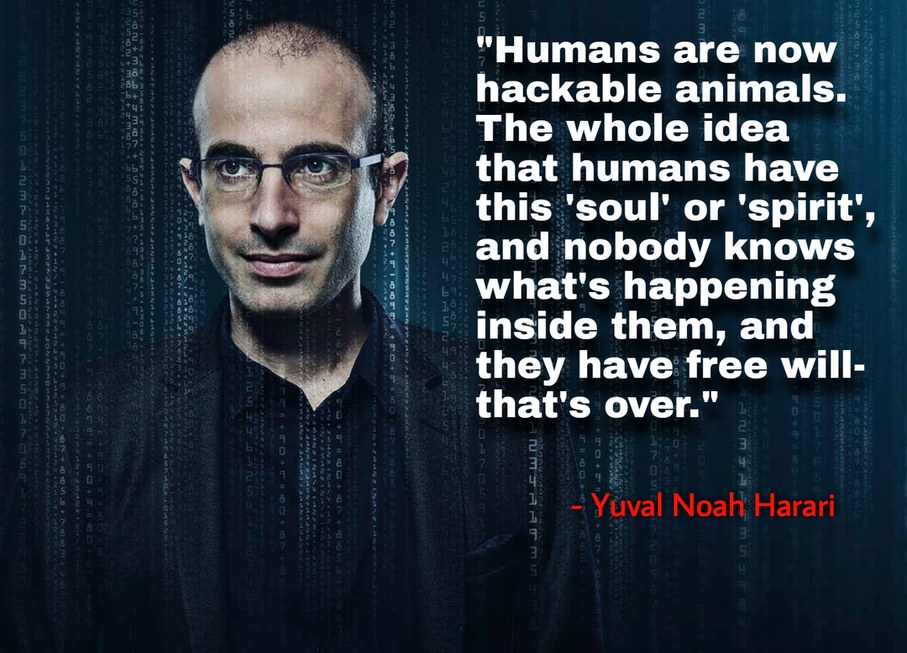Honestly, Yuval Noah Harari can shove it. If that is the kind of future he wants, go for it buddy. But be assured, that is not what we want or what we are planning on building as parallel civilizations cleave off from this smug technocratic arrogance. Do us all a favor, Harari would you, take the Covid syringe and get yourself all the biometrical hook ups for your own surveillance and take Bourla with you will you? Then let us know how it works out for you because we are not interested, we reject your bizarre technocratic future you and Schwabie envision and we simply do not consent.
________
The Satanist Jewish Homosexual Justifying Genocide
March 30, 2022
Judaism is Satanism. The essence of Satanism is to deny the existence of God and His Law. Without their Divine connection, the goyim can be enslaved, dispossessed and culled. This is the Masonic Jew World Order. This is Agenda 2030.
"There are no gods in the universe, no nations, no money, no human rights, no laws, and no justice outside the common imagination of human beings."
Schwab Advisor Yuval Harari in Sapiens, p. 28
A Review of Sapiens
by Casey Luskin
(excerpt by henrymakow.com)
Did Religion Evolve, or Was It Designed, to Foster Cooperation?
Harari's conjecture -- "There are no gods" -- is not just a piece of inconsequential trivia about his worldview -- it forms the basis of many other crucial claims in the book. This naturalistic assumption permeates Harari's thinking.
For example, Harari assumes that religion evolved by natural processes and in no way reflects some kind of design or revelation from a God. In fact, one of his central arguments is that religion evolved when humanity produced "myths" which fostered group cooperation and survival. Harari spends a lot of time developing this argument. Here are some key excerpts from the book:
Legends, myths, gods and religions appeared for the first time with the Cognitive Revolution. Many animals and human species could previously say, 'Careful! A lion!' Thanks to the Cognitive Revolution, Homo sapiens acquired the ability to say, 'The lion is the guardian spirit of our tribe.' This ability to speak about fictions is the most unique feature of Sapiens language. ...
[F]iction has enabled us not merely to imagine things, but to do so collectively. We can weave common myths such as the biblical creation story, the Dreamtime myths of Aboriginal Australians, and the nationalist myths of modern states. Such myths give Sapiens the unprecedented ability to cooperate flexibly in large numbers. ...
How did Homo sapiens manage to cross this critical threshold, eventually founding cities comprising tens of thousands of inhabitants and empires ruling hundreds of millions? The secret was probably the appearance of fiction. Large numbers of strangers can cooperate successfully by believing in common myths. Any large-scale human cooperation -- whether a modern state, a medieval church, an ancient city or an archaic tribe -- is rooted in common myths that exist only in people's collective imagination. Churches are rooted in common religious myths. Two Catholics who have never met can nevertheless go together on crusade or pool funds to build a hospital because they both believe that God was incarnated in human flesh and allowed Himself to be crucified to redeem our sins. States are rooted in common national myths. ...
Despite the lack of such biological instincts, during the foraging era, hundreds of strangers were able to cooperate thanks to their shared myths. ...
Myths, it transpired, are stronger than anyone could have imagined. When the Agricultural Revolution opened opportunities for the creation of crowded cities and mighty empires, people invented stories about great gods, motherlands and joint stock companies to provide the needed social links. While human evolution was crawling at its usual snail's pace, the human imagination was building astounding networks of mass cooperation, unlike any other ever seen on earth. Sapiens, pp. 24, 25, 27, 102, 103
Thus if Harari is correct, then religion was not designed, but is a behavior which evolved naturally because it fostered shared "myths" which allowed societies to better cooperate, increasing their chances of survival. This view grows out of his "no gods in the universe" perspective because it implies that religion was not revealed to humanity, but rather evolved.
Harari is undoubtedly correct that shared beliefs -- or "myths," as he pejoratively calls them -- facilitate group cooperation, and this fosters survival. But this is an observation about shared beliefs, myths, and religion, not an explanation for them. And it is quite easy for a design-based model to account for these observations in a manner that requires no unguided evolution. Here's what it might look like:
(These psychopaths are destroying our world)
Perhaps shared "myths" that foster friendship, fellowship, and cooperation among human beings were not the result of random evolution or "pure chance" (as Harari describes our cognitive evolution), but rather reflect the intended state of human society as it was designed by a benevolent creator.
If this is the case, then "large-scale human cooperation," as Harari puts it, might be the intentional result of large-scale shared religious beliefs in a society -- a useful emergent property that was intended by a designer for a society that doesn't lose its religious cohesion.
In other words, these benefits may be viewed not as the accidental byproduct of evolution but as intended for a society that pursues shared spirituality.
---------------------------
Related- John Kaminski - Vaccines Kill the Soul
Makow - Organized Judaism = Organized Theft (Begining with your soul, and then everything else)
-------------"Creative Destructive" & 6uild 6ack 6etter
https://www.theamericanconservative.com/dreher/yuval-noah-hararis-dystopia/
https://www.timesofisrael.com/yuval-noah-harari-no-matter-what-he-does-putin-has-already-lost-this-war/
https://tv.gab.com/channel/theclayclark/view/yuval-noah-harari-whos-steering-623f7a89fac1fac05a282e0d
Did Religion Evolve, or Was It Designed, to Foster Cooperation?
Harari's conjecture -- "There are no gods" -- is not just a piece of inconsequential trivia about his worldview -- it forms the basis of many other crucial claims in the book. This naturalistic assumption permeates Harari's thinking.
For example, Harari assumes that religion evolved by natural processes and in no way reflects some kind of design or revelation from a God. In fact, one of his central arguments is that religion evolved when humanity produced "myths" which fostered group cooperation and survival. Harari spends a lot of time developing this argument. Here are some key excerpts from the book:
Legends, myths, gods and religions appeared for the first time with the Cognitive Revolution. Many animals and human species could previously say, 'Careful! A lion!' Thanks to the Cognitive Revolution, Homo sapiens acquired the ability to say, 'The lion is the guardian spirit of our tribe.' This ability to speak about fictions is the most unique feature of Sapiens language. ...
[F]iction has enabled us not merely to imagine things, but to do so collectively. We can weave common myths such as the biblical creation story, the Dreamtime myths of Aboriginal Australians, and the nationalist myths of modern states. Such myths give Sapiens the unprecedented ability to cooperate flexibly in large numbers. ...
Despite the lack of such biological instincts, during the foraging era, hundreds of strangers were able to cooperate thanks to their shared myths. ...
Myths, it transpired, are stronger than anyone could have imagined. When the Agricultural Revolution opened opportunities for the creation of crowded cities and mighty empires, people invented stories about great gods, motherlands and joint stock companies to provide the needed social links. While human evolution was crawling at its usual snail's pace, the human imagination was building astounding networks of mass cooperation, unlike any other ever seen on earth. Sapiens, pp. 24, 25, 27, 102, 103
Thus if Harari is correct, then religion was not designed, but is a behavior which evolved naturally because it fostered shared "myths" which allowed societies to better cooperate, increasing their chances of survival. This view grows out of his "no gods in the universe" perspective because it implies that religion was not revealed to humanity, but rather evolved.
Harari is undoubtedly correct that shared beliefs -- or "myths," as he pejoratively calls them -- facilitate group cooperation, and this fosters survival. But this is an observation about shared beliefs, myths, and religion, not an explanation for them. And it is quite easy for a design-based model to account for these observations in a manner that requires no unguided evolution. Here's what it might look like:
Perhaps shared "myths" that foster friendship, fellowship, and cooperation among human beings were not the result of random evolution or "pure chance" (as Harari describes our cognitive evolution), but rather reflect the intended state of human society as it was designed by a benevolent creator.
If this is the case, then "large-scale human cooperation," as Harari puts it, might be the intentional result of large-scale shared religious beliefs in a society -- a useful emergent property that was intended by a designer for a society that doesn't lose its religious cohesion.
In other words, these benefits may be viewed not as the accidental byproduct of evolution but as intended for a society that pursues shared spirituality.
---------------------------
Related- John Kaminski - Vaccines Kill the Soul
Makow - Organized Judaism = Organized Theft (Begining with your soul, and then everything else)
-------------"Creative Destructive" & 6uild 6ack 6etter
https://www.theamericanconservative.com/dreher/yuval-noah-hararis-dystopia/
https://www.timesofisrael.com/yuval-noah-harari-no-matter-what-he-does-putin-has-already-lost-this-war/
https://tv.gab.com/channel/theclayclark/view/yuval-noah-harari-whos-steering-623f7a89fac1fac05a282e0d



No comments:
Post a Comment
Note: Only a member of this blog may post a comment.